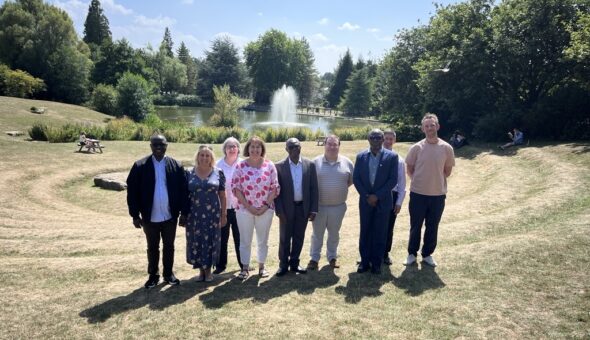Learning Technologist Keith Brown talks with Philip Rogers about how the Department of Pharmacy & Pharmacology used a creative TEL solution that allowed them to continue teaching when the University was closed due to snow earlier this year.
What is Inter-Professional Education in the MPharm?
For the last four years, the department of Pharmacy and Pharmacology has collaborated with the University of Exeter Medical School to implement Inter-Professional Education (IPE) based on real-time simulations of a cardiovascular risk assessment. The tasks are designed to enable medical and pharmacy students to learn about their future roles in managing patients with cardiovascular disease.
How has IPE been implemented?
Both institutions run Moodle; thus, it has been possible to implement a shared Moodle course on our site, providing students with access to resources, including videos of patient consultations. Our students manage a set of cardiovascular risk assessments for six middle-aged patients as the ‘community pharmacist’, and the medical students play the ‘GP’ role. The pharmacy students have to assimilate information from the consultation, calculate patients’ QRisk scores and make referrals to the GP, played by the medical students. Typically, a medical student may then initiate prescribed treatment, which is evaluated by a pharmacy student.
How does it work?
Normally, workshops are timetabled in computer labs where I facilitate the entire cohort in real-time. Our cohort is divided into groups of three students per group, and each group is paired with a group of three medical students. This arrangement involves using forums to communicate and works well. However, careful timetabling at both institutions is needed, so rescheduling is not viable. When the University was closed due to snow on the morning of the first workshop, a creative solution needed to be found.
What happened on the ‘Snow Day’?
Following the 7.30am snow announcement, students were informed by email and social media that we were going to proceed with a virtual workshop. Their response was really positive!
I first asked the students to ‘self-organise’ and to gather into their normal groupings at a suitable location that had access to wi-fi. In almost all cases, the students were able to congregate in the city, and to access Moodle on their mobile devices. This gave them access to the simulations and materials on Moodle, and they were able to communicate with their paired group using forums. For those students who could not come together in-person, a variety of social media was exploited, including Snapchat, Facebook, Instagram and What’s App.
"With student goodwill, social media, Moodle working really well, and facilitation online from me, we managed to deliver the complete workshop to time with 32 students."
How did you facilitate the IPE session?
Instead of providing verbal instructions in the computer lab, I decided to use email because it was the simplest and easiest method, and was accessible to all students on their devices. This entailed me firing an almost constant stream of emails in order to co-ordinate their viewing of the videos and co-ordinating interactions with medical students on the forums.
Did it work?
With student goodwill, social media, Moodle working really well, and facilitation online from me, we managed to deliver the complete workshop to time with 32 students.
My impression is that the session was entirely satisfactory, albeit hard work! Students seem happy, with much the same results as running a face-to-face workshop. Not running the session would have resulted in revising content delivery and rescheduling computer labs at both institutions. I’m pleased that technology came to our rescue, and to sum up, it all worked incredibly well!
Respond


